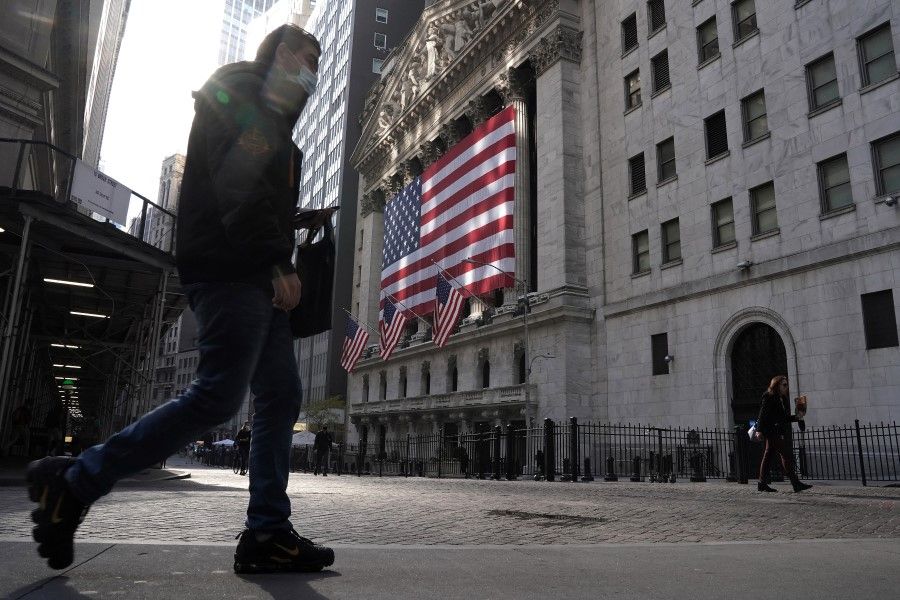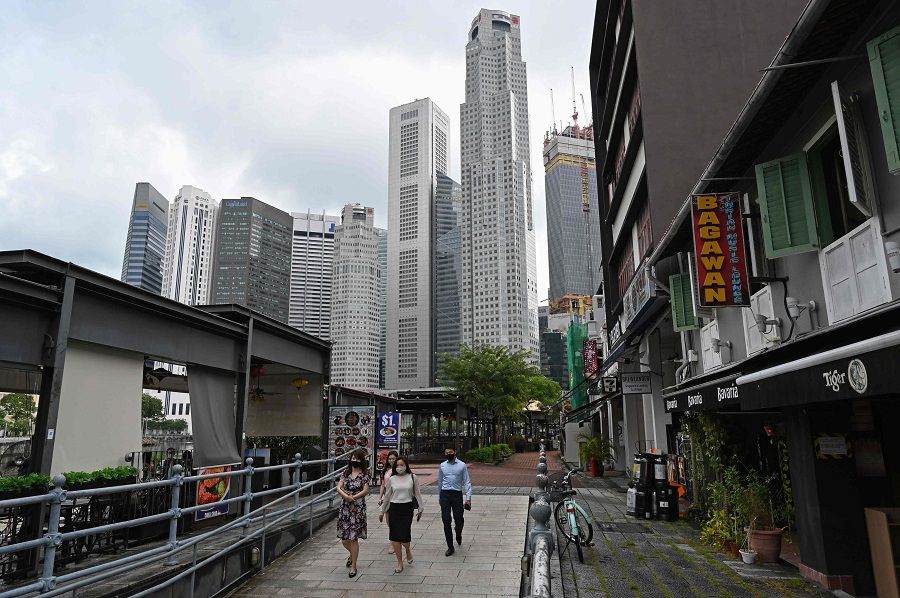A reshuffle of global financial centres on the cards?

In the competition among global financial centres, London used to be evenly matched with New York and has more than once topped the Global Financial Centres Index by think tank Z/Yen Group.
However, since Brexit in 2016, London has consistently fallen behind New York and has even found its position as the European financial capital threatened. In the index released in March 2020, London's score plunged by 31 points, the largest drop among the top 20 Western European financial centres.
Hong Kong was also affected by its anti-extradition movement: its score dropped by 34 points, and its global position slid from third to sixth, lagging behind Tokyo, Singapore, and Shanghai by a small margin.
This index, by all means, is not perfect, but there are many precedents of politics affecting financial centres' global standing. Today's regional financial centres, such as Frankfurt and Shanghai, might become tomorrow's global financial centres. From Italian city-states (Venice and Genoa) to Amsterdam, and from London to New York, the appellation of global financial capital has shifted throughout history.

In fact, the shift follows a historical pattern. Apart from the region's importance in the global trading system and the city's physical infrastructure, a city with a strong and stable central bank has a natural advantage in becoming a global financial centre, given the interwoven nature of the financial sector, its regulations and local authorities.
Unlike other industry clusters, the financial sector cluster tends to be in capital cities, so as to facilitate bureaucratic processes, interpret policy directions, and to have better access to regulatory bodies.
The city's openness to global capitalism and culture would also determine how far it can grow its financial sector. The US and the UK's increasing tendency towards Western populism and Hong Kong's accelerating drift away from liberalism both seem to signal another reshuffle of global financial centres.
Draw of central banks and capital cities
The "reputation" of a financial centre is often discussed, and this seemingly vague criterion is actually a good indication of the local government and agencies' familiarity with the financial sector. Given the nature of the industry, disputes over assets and conflicts of interest make the financial sector a highly sensitive sector, with additional legal checks and regulations. Unlike other industry clusters, the financial sector cluster tends to be in capital cities, so as to facilitate bureaucratic processes, interpret policy directions, and to have better access to regulatory bodies.
The UK is a good example. While Lloyds Banking Group and Midland Bank (now merged with HSBC) were established in Birmingham, they were later headquartered in London. Apart from operational needs and cluster theory (proposed by US academic Michael Porter), this was because the Bank of England was also in London.

Another example is New York. While it was already an important trading port when the United States of America was founded, in the early 19th century and even before the Civil War of 1861 to 1865, the US financial centre was located in Philadelphia, which was considered to be the country's de facto first capital. The Philadelphia-based Second Bank of the United States (also known as BUS) was endowed with central bank responsibilities and authority, but it was in fact not owned by the federal government.
On the grounds of corruption and obstruction of state sovereignty, the seventh US President Andrew Jackson (1829-1837) removed federal deposits in BUS and ended public duties of the bank in 1836. This began the "Free Banking Era" of 1837 to 1864, when the federal government transferred the monetary responsibilities to state governments.
Although banks may start in various regions to cater to the demand for trade, such demand is not the only condition relevant to the financial sector. Having seasoned and cooperative local authorities is also crucial in building a financial centre.
New York, then a regional financial hub with talented bankers, already had the US's first stock exchange. More importantly, the New York government had prior experience regulating the financial sector. Apart from requiring banks to back banknotes issued with market securities, the local regulators implemented rules and provided safeguards against the economic impact of chartered banks' failures. New York was thus able to surpass Philadelphia, which had the first-mover advantage, and other contenders (e.g. Boston), to be financial institutions' new favourite. In the early 20th century, the Federal Reserve Bank of New York was the most influential among the 12 Federal Reserve Banks, allowing the city to become the undisputed financial capital of the US.
Although banks may start in various regions to cater to the demand for trade, such demand is not the only condition relevant to the financial sector. Having seasoned and cooperative local authorities is also crucial in building a financial centre.
Reliability for robust business environment
If cooperation with regulators is the foundation of financial centres, then the "upper limit" to internationalising the financial centre is determined by the local political environment, economic factors and stability provided by the rule of law. The city must also be able to maintain an open attitude towards global capital and foreign culture.

The financial sector may be good at calculating risks, but it is unable to deal with unknown uncertainties. Any kind of extreme policies, uninterpretable laws, economic instability or social unrest may jeopardise the permanence of financial institutions. Thus, a steady but robust business environment is the primary condition for building a financial centre.
... the key to building a successful financial centre is not loosening banking regulations unconditionally but rather, adopting appropriate recommendations from financial institutions.
In fact, following the 2008 financial crisis, if the US did not propose appropriate measures to prevent history from repeating itself, New York's financial status might have been in question as well. Similarly, if the US Federal Reserve did not coordinate with the banks during the numerous financial crises, there would have been more capital flight from New York.
From the perspective of policy planning and regulatory supervision, the key to building a successful financial centre is not loosening banking regulations unconditionally but rather, adopting appropriate recommendations from financial institutions. This explains why banks congregated in New York and London. Instead of relaxing regulations, there must be good communication between the government and the financial players in order to let financial centres flourish.
Stability and openness key
From a market stability point of view, it is certainly not accidental that many global financial centres are located in cities of large economies. Apart from large and deep markets and the potential for client development, the size of the country's economy also determines the liquidity and credibility of its currency. If the economy is small, even if it is well-developed and highly open, should its currency turn international, it could bring about unnecessary capital risks to the country. This does not mean that small economies cannot become international financial centres; innovative monetary policies could foster a robust local economy and a stable financial market simultaneously.

Taking Singapore as an example, aside from emphasising the rule of law, its late founding Prime Minister Lee Kuan Yew was deeply influenced by the concept of an "Asian capital market". Although Singapore does not have a large economy to support its currencies, it separates its Singaporean dollar assets from its foreign currency assets, successfully maintaining the stability of the domestic economy while making Singapore the transit point for international financial instruments.
Similarly, at the peak of globalisation today, financial centres must embrace multiculturalism and attract talents of all kinds.
Globalisation has a great impact on the financial sector. To promote the free flow of capital, global financial centres must create business environments that connect with other markets easily. Therefore, openness is also a necessary condition for establishing international financial centres. 17th century Netherlands was relatively tolerant to foreign cultures and religions in comparison to other European states. Because of this tolerance, Amsterdam became home to pagans all around Europe, a cultural melting pot, and a gathering place for businessmen.
In addition, the Dutch Republic had just overthrown the Spanish dictatorship, and society valued individual freedoms and independence, to a certain degree, from the control of the king and the pope. This business environment allowed capitalism to thrive. The world's first modern stock market was established in Amsterdam in 1602, following the founding of Dutch East India Company. Although the Dutch Golden Age ended in war, Amsterdam's free business spirit reappeared in New York when immigrants left Amsterdam for the new world. New York, then called New Amsterdam, embarked on the journey to become the trading capital of the world much earlier than it had become a British colony.

Similarly, at the peak of globalisation today, financial centres must embrace multiculturalism and attract talents of all kinds. As Asia gradually becomes home to global finance, European and American markets must gain a deeper understanding of the Eastern markets. Conversely, Asian markets must also attract talents familiar with traditional financial markets to ensure a smooth transition from the old to the new.
In the early 20th century, London had not recovered from the First World War while New York had not matured as a new global financial centre. Starved with leadership, the global financial market crashed into the Great Depression in the 1930s.
Today, populism plagues the West, and anti-liberal movements proliferate in the East as a result of a surge in nationalism. On this trajectory, it seems increasingly difficult - or perhaps even impossible in the long term - for global financial centres, such as London and Hong Kong, to continue fulfilling the two requisites of "stability" and "openness". History seems to be advancing the reshuffling of the global financial centres once again.
Related: Is Shanghai on track to becoming an international financial centre in 2020? | End of special status with US will have little impact on Hong Kong's financial industry | Jack Ma: Traditional banks are operating with a 'pawn shop' mentality | China's tightening fintech regulations may benefit Ma Yun's Ant in the long term | China's AIIB vs Japan's ADB: Which is more powerful?
